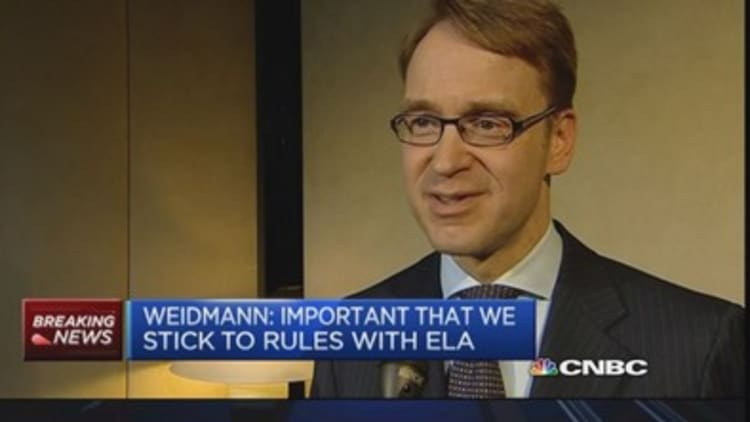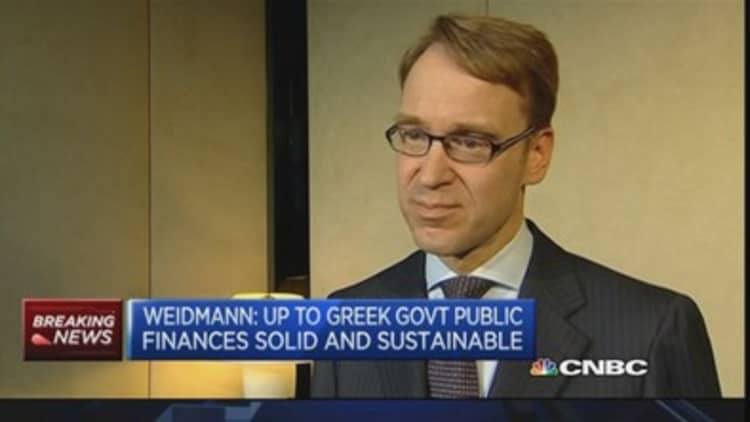


Resolving the crisis over Greece's funding needs is a job for policymakers and Athens—not the European Central Bank (ECB), the President of the German Bundesbank told CNBC on Thursday.
"The question of how a country that is in need of financing—and has no market access—is to be financed is a question that policymakers have to answer," said Jens Weidmann, head of the German central bank and a decision-making member of the ECB's executive board.
Speaking from Frankfurt after presenting the Bundesbank's 2014 accounts, he added: "That is what the rescue funds are there for, and they have to see whether the conditions are met for the funding to continue or be disbursed. This is not the job of monetary policy."
Greece's coffers are running dry as the battle between its new left-wing government and the country's bailout supervisors over the terms of its financial aid programs drags on.
The German parliament—along with its euro zone neighbors—approved a four-month extension of Greece's bailout last month. This was despite widespread opposition from German politicians, who have pushed for aid to be conditional on Greece instigating more severe structural reforms and austerity measures.
On Thursday, Weidmann said the ECB was just sticking "to our rules" in insisting that certain conditions were met before Greece received further funding.
"We stick to our rules. We are not making politics here; we are just doing our job," he told CNBC.
"It is up to the Greek government to make sure that public finances are solid and sustainable. This is then the condition for us to continue normal funding operations, given that we have certain conditions that, for instance, collateral has to meet."
Worsening German-Greek relations have seen Athens resurrect a long-standing spat over the Nazi occupation of Greece during World War II, for which it claims never to have received full compensation.
Read MoreTensions high as Greece makes WWII payback threats
On Tuesday, Greek Prime Minister Alexis Tspiras accused Germany of using "legal tricks" to get out of paying reparations, while Greece's Justice Minister has suggested that German-owned property in Greece could be confiscated as compensation.
QE risk to balance sheets
Weidmann also told CNBC that the Bundesbank had begun making asset purchases under the ECB's 1 trillion euro ($1.1 trillion) quantitative easing program, which launched at the start of this week.
"We have started to implement the purchases, and so far, there is no hint that we are unable to achieve the targeted volumes," said the economist, whose previously worked for the International Monetary Fund in Washington D.C.
Read MoreDraghi: ECB QE risks are contained
Sovereign bonds in several euro zone countries are at record highs, with short-term German Bunds of up to seven years in duration trading with negative yields (bond prices and yields move inversely).
This means that the balance sheets of central banks like the Bundesbank could take a hit when yields eventually start rising.
Weidmann said: "This is not an issue that is particularly special to the Bundesbank, but this is an issue that relates to the program as such. If you buy fixed income assets when the interest rate is low, you have a risk that you make losses going ahead."


